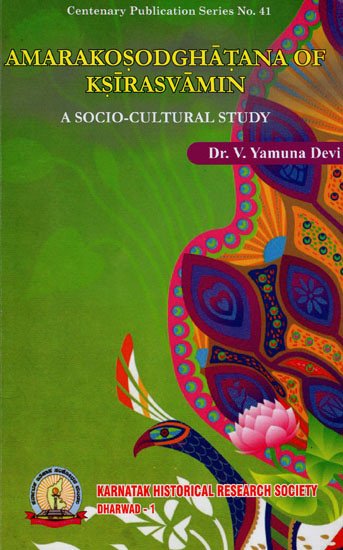Amarakoshodghatana of Kshirasvamin (study)
by A. Yamuna Devi | 2012 | 77,297 words | ISBN-13: 9788193658048
This page relates ‘Politics and Administration (8): Social Evils’ of the study on the Amarakoshodghatana of Kshirasvamin (in English) which represents a commentary on the Amarakosha of Amarasimha. These ancient texts belong the Kosha or “lexicography” category of Sanskrit literature which deals with the analysis and meaning of technical words from a variety of subjects, such as cosmology, anatomy, medicine, hygiene. The Amarakosa itself is one of the earliest of such text, dating from the 6th century A.D., while the Amarakoshodghatana is the earliest known commentary on that work.
Politics and Administration (8): Social Evils
Some of the social evils mentioned in Amarakośa are refleceted in the commentary of Kṣīrasvāmin are as follows:
(i) Upadā (II. 8. 29; p. 181-82)–
[Present/gift:]
The enumeration of words to denote gift is done by Amarakośa in the Brahma varga and Kṣatriya varga clearly demarcates the gifts–the gifts bestowed as benovelance without expectations and the other pertaining to the gifts given to people in special posts to please them and expecting a favour in return. Such presents are mentioned in Amarakośa as prābhṛtam, pradeśanam, upāyanam, upagrāhyam, upahāraḥ and upadā.
While Kṣīrasvāmin observes that according to some Upadā is bribe, also called utkoca or lañcā–
Kṣīrasvāmin adds kauśalikaṃ and ḍhaukanaṃ to the list of words denoting a special gift–
kauśalikaṃ ḍhaukanaṃ ca |
The existence of corruption in the bureaucracy among government officials is also reflected in Kṣīrasvāmin explaining the term upadā as bribe.
(a) Yautakam (II. 8. 29; p. 181-82)–
[Special gifts.]
Amarakośa mentions yautakam, sudāya and haraṇa as special gifts.
From Kṣīrasvāmin's explanation it is clear that the yautaka is the gifts offered to the newly wedded couple. He also cites Śāśvata (45) justifying his explanation–
yutayorvadhūvarayoridaṃ yautakam | ādi śabdād bandhudattādi | yacchāśvataḥ—yautakādi dhanaṃ dāyo dāyo dānaṃ ca kathyate |
(ii) Unemployment:
Kṣaṇa[1] (III. 3.47; p. 281)–Liesure: In explaining the term kṣaṇa in the meaning of liesure,
Kṣīrasvāmin cites an example from Pañcatantra (I. 54) meaning one who is at liesure has no secrets–
nircyāpārāsane yathā—kṣaṇo nāsti raho nāsti |
(iii) Poverty:
(a) Niḥsva (III. 1. 49; p. 246)–
[Poverty:]
Poverty did exist in society which is reflected by the mention of words to denote the poor.
Amarakośa says the poor were termed niḥsvaḥ and durvidha, to which Kṣīrasvāmin adds duḥsthaḥ and kīkaṭaḥ–
duḥsthaḥ kīkaṭaśca |
104 nircyāpara sthitau kālaviśeṣotsavayoḥ kṣaṇaḥ |
(b) Lolupa, lolubhau (III. 1. 22; p. 210)–
[Covetous:]
While commenting on the word lolupa Kṣīrasvāmin adds lālasa and lampaṭa to denote covetous men–
lālaso lampaṭaśca |
(c) Tṛṣṇak (III. 1. 22; p. 240)–
[Greedy:]
Kṣīrasvāmin observes that metaphorically the word tṛṣṇak is employed to denote a covetous person. He also specifies that the word tṛṣṇak is ‘ja’ anta–terminating in ‘ja’. He adds tṛṣita, taṛṣita and pipāsita to denote the greedy.
While extremely covetous were lālasaḥ and lampaṭaḥ:
tṛṣyati tacchīlastṛṣṇak svapitṛṣornajiṅ tṛṣṇagjāntaḥ lubdhaṃ upacāraḥ | tṛṣyati | tṛṣipipāsāyām || tṛṣitastarṣitā pipāsitaśca |
(d) Avinītaḥ (III. 1. 23; p. 240)–
[Misbehaving:] A misbehaving man was termed avinīta. Kṣīrasvāmin adds the word nirmaryāda in the same meaning–
āvinītaḥ nirmayādo'pi
The various terms to denote the consumption of alchohol and related terms reveal that drinking was prevalent in the society such as śāuṇḍāpāna–tavern, madhuvārā–tippling and varieties of wine dicussed under food and beverages.
(e) Śauṇḍotkaṭa (III. 1. 23; p. 240)–
[Drunk:]
Kṣīrasvāmin expalins the term śauṇḍotkaṭa as a drunkard, always in tavern–
śuṇḍāyāṃ bhavaḥ śauṇḍaḥ śuṇḍāstyasya vā śuṇḍāyāṃ pānagāre bhavaḥ |
The presence of harlots is known from the synonyms discussed under section on Women.
Footnotes and references:
[1]:
nircyāpara sthitau kālaviśeṣotsavayoḥ kṣaṇaḥ |
